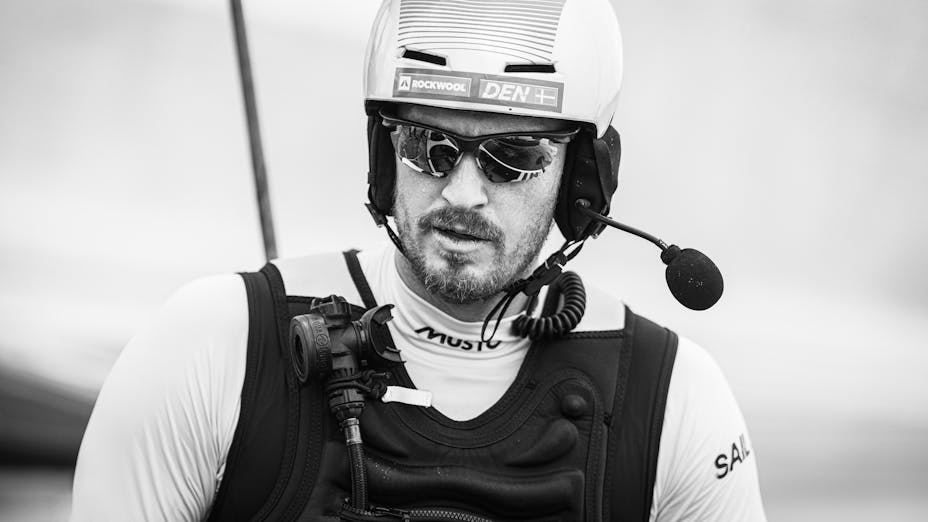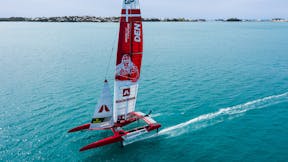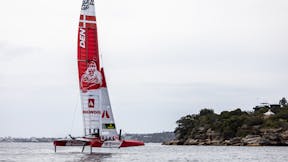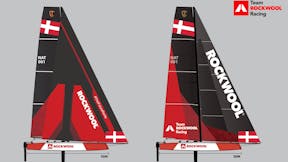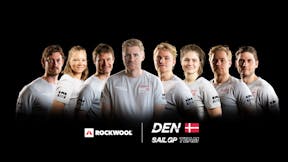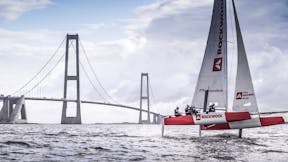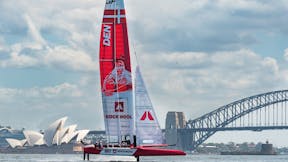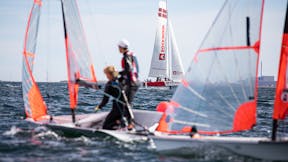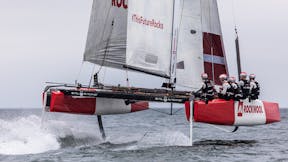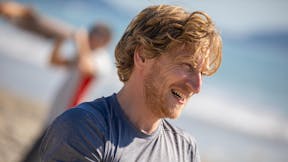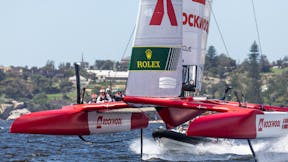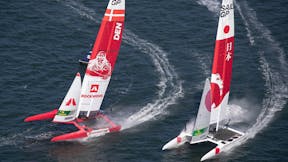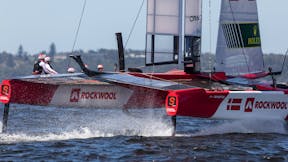Denmark SailGP Team grinder Martin Kirketerp is no stranger to flying the Danish flag on a global stage. Almost 12 years ago, he achieved a feat most athletes can only dream of – winning Olympic gold in Beijing, representing his country in the 49er class.
He is one of only a handful of SailGP athletes to have won sport's ultimate honour – and he admits that his time spent on the Olympic circuit, a world so transfixed on efficiency, performance and optimisation, has left a lifelong impact on the way he lives his life.
We caught up with Martin to find out what he's been up to since Sydney, how the Denmark SailGP Team works to optimise performance – and learn a bit more about just what it takes, physically and mentally, to win an Olympic gold medal.
You missed the event in Sydney due to a fractured shoulder. How's the recovery going?
It's a lot better for sure. All my medical appointments have been cancelled so I'm my own doctor now, which is a bit scary, but it feels good. The bone should be healed by now. I'm still lacking a bit of movement when I raise the arm above my head, but everything else is fully operational.
How are you keeping fit in lockdown?
I can honestly say I've never trained harder than I have in the last month in my whole life. I'm working out for around 4 hours per day. I've been running a physio programme every day, and day by day I'm getting stronger. For legs and core, I've been going hard, but need to watch the shoulder a bit. I'm lucky to have some home gym equipment and a garden, so I've been working with a personal coach to get back into shape. It's going really well. Obviously I'm missing the bigger lifts, like bench press and deadlifts, but there's so much other stuff you can do, and in reality that's more what I need at this stage – lunges, with kettlebells, sprinting, jumping around. I look like a mad man, and the neighbours wonder what I'm up to. I'm getting a lot of work done, for sure.
How does the Denmark SailGP Team stay energy-efficient, and what are the key elements to optimise performance?
Being a grinder on Denmark SailGP Team is by far the most physical job onboard the F50 – you have to be in good shape – but you also have to be smart and efficient with your energy. If you grind too late, you could end up grinding three or four times as much as if you have good timing. That's not a smart use of your energy. If the Wing Trimmer has to tell you to grind, it's already too late. But it's not just about being a machine that turns the handles. You need to be really tuned in to the boat, and communication is key. You can feel when things are going well and when they're not, you're constantly on your toes, looking at the platform and reading the data. The most efficient SailGP teams are perfectly tuned and synchronised, and have great teamwork.
You might only be competing in 12 minute races, but do you think that the short races push you to use even more energy, because there’s no time to back off?
Yes – we don't leave anything out on the race course, it's full on all the time. But it's not just about closing your eyes and pushing as hard as you can. You have to know where and how to spend your energy. Sometimes you might have to push as hard as you can for 10 seconds, sometimes it's a smaller adjustment for just 1-2 seconds – the more you understand what is needed at each time, you're saving a lot of energy for when you most need it, and we do a lot of races in one day. As a new boat and new team, you're learning all the time, and our main goal as the grinders is to be as synchronised as possible, non-verbal communication and achieve a steady platform. It's getting better every time we sail but we're not perfect yet, and we'll constantly be working on that.
You won Olympic gold for Denmark in 2008 in the 49er class – but you looked very different then. How did you optimise your body for performance and efficiency in preparation for the Games?
I'm pretty well known in the sailing world for being able to change my weight quickly. For the Olympics in 2008, I had to slim down as much as was physically possible and still be able to function as a human being. The Olympic mindset is all about optimising performance and efficiency – and with light winds in Beijing, we knew that we needed to be as light as possible. I was down to around 70 kilograms at the Games – for perspective, right now I'm around 100 kilograms!
Tell us more about the Olympic mindset – when you've spent years tuning your mind and body for efficiency like a machine, how does it feel, and how does that impact your life post-Olympics?
Absolutely. You have to do whatever you think it takes to win the medal. Due to the bigger goal, you do it without getting angry, annoyed or frustrated – you just have to cope with it. It's part of the game. For me, it was quite easy to get down to 70 kilograms because I had the Olympics in mind – it was beneficial for performance so it was a clear strategy and goal. My mind was set on the fact that this was my chance, and I had to do everything I could do to gain competitive advantage – I knew I couldn't look back knowing I could have done more. I do think that the Olympic mindset changes you forever. We learned so much in terms of preparation, character, way of thinking, dealing with problems, things that I've used a lot later in life, including in SailGP.
When you're so tuned in to an objective like the Olympics, how would it feel as an athlete to have the Games moved, as we've seen this year – it must be quite disruptive to training and mindset?
It would be totally devastating. It's obviously a very necessary step in the circumstances, but I do really feel for those athletes coming towards the end of their career, with this being their last Olympics. They'll be another year older, and you spend a lot of time setting up your post-Olympics life, whether it be a job, university, buying a house, making plans – you have your life before the Games, and your life after the Games. It's a big spanner in the works for athlete preparation and focus, it would be hard to cope with, because when you're an Olympic athlete it's your whole life. In some ways it can be quite a selfish existence – but you have to have that mindset to win. But the Olympic mindset teaches you that these situations happen, none of us asked of it, but you've got to cope with it, stay calm and try to make the best out of the situation.
To check out our new energy efficiency tool and learn how you can become more energy efficient, click here!

